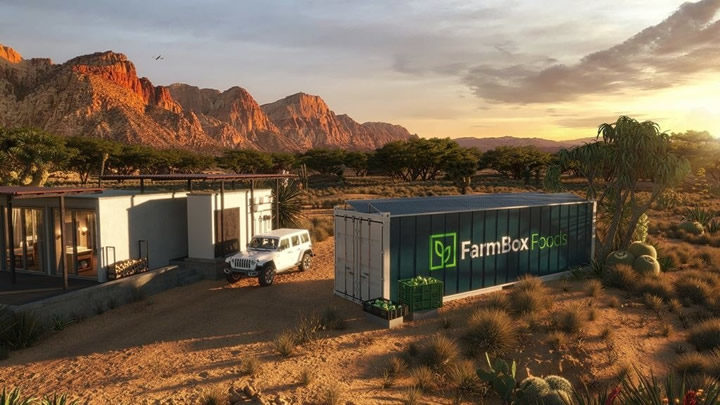Are High-Tech Containers the Future of Farming?

With increasingly unpredictable weather patterns impacting crops and a continuing global supply chain crisis affecting millions, a Colorado company is using tech-based indoor farming to make sure no one goes without a reliable, secure source of nutrient-rich food.
FarmBox Foods, based in Sedalia, Colorado, has spent the last four years developing automated farms in shipping containers to grow gourmet mushrooms, organic leafy greens, culinary herbs, peppers, small tomatoes and fodder for livestock. The mission-driven company is focused on helping feed those living in food deserts while empowering local communities and providing jobs and educational opportunities.
The upcycled shipping containers that house these systems can be placed virtually anywhere in the world — from island nations and urban areas to college campuses and the far reaches of Alaska — and produce food year-round. FarmBox Foods' patented vertical hydroponic system grows highly nutritious leafy greens, culinary herbs, peppers, tree saplings and more with less labor and maintenance than traditional farms and horizontal hydroponic operations.
The state-of-the-art Gourmet Mushroom Farms alone produce an average of 400 pounds of mushrooms per week, year-round. Up to 18 varieties and species of gourmet and medicinal mushrooms can grow simultaneously, including oysters, shiitake, reishi, Lion's mane, chestnut and turkey tail.
The hydroponic fodder system yields more than 1,000 pounds of the protein-rich dietary supplement each day. This takes advantage of every single inch of the shipping container to generate high yields of gourmet mushrooms in a small space.
FarmBox Foods' patented Vertical Hydroponic Farm maximizes growing space while minimizing energy and water usage. Combining patented vertical farming tubes with sensor technology and automation, the ultra-efficient farms transport easily, can be stacked, and are solar capable.
This uses 99% less water than traditional farms, and the fully controlled enclosed growing environment is protected from pests and pathogens. This reduces and can eliminate entirely the need for pesticides, allowing people to harvest and eat untainted, farm-fresh produce. Setting up the 320-square-foot containers in or near populated areas also reduces food waste, as the food is able to get to the table more quickly and can better retain its nutritional value.
"The real mission in this whole thing is to be able to feed the world in places that ordinarily wouldn't be able to grow food," said Rusty Walker, CEO of FarmBox Foods. "Join us in decentralizing agriculture and reducing carbon emissions while helping to feed the world."
About FarmBox Foods
FarmBox Foods strives to change the way the world farms by connecting communities to sustainably sourced, locally grown food, year-round. The company brings food security, safety, and sustainability to communities through its Vertical Hydroponic Farms (VHF) and Gourmet Mushroom Farms (GMF) and have been doing so since 2017. FarmBox Foods continues to craft alternatives to centralized food systems with high-yield, low carbon footprint container farms.
These cutting-edge farm designs promote easy operation and maintenance while reducing the risk of food-borne illnesses. Not only can the specialized farms be equipped with solar technology allowing for off-grid operation, but their innovative hydroponic watering system does not contribute to groundwater pollution. FarmBox Foods' short-term goals include partnering with institutions that help provide the biggest possible impact for the most people, including food banks, schools, hospital groups and prisons.
To learn more about FarmBox Foods or for inquiries about purchasing a container farm, visit the company website at www.farmboxfoods.com, email them at info@farmboxfoods.com, or call 800-946-1723 to speak directly to a FarmBox Food Hydroponics Expert today.
Comments (0)
This post does not have any comments. Be the first to leave a comment below.
Featured Product

